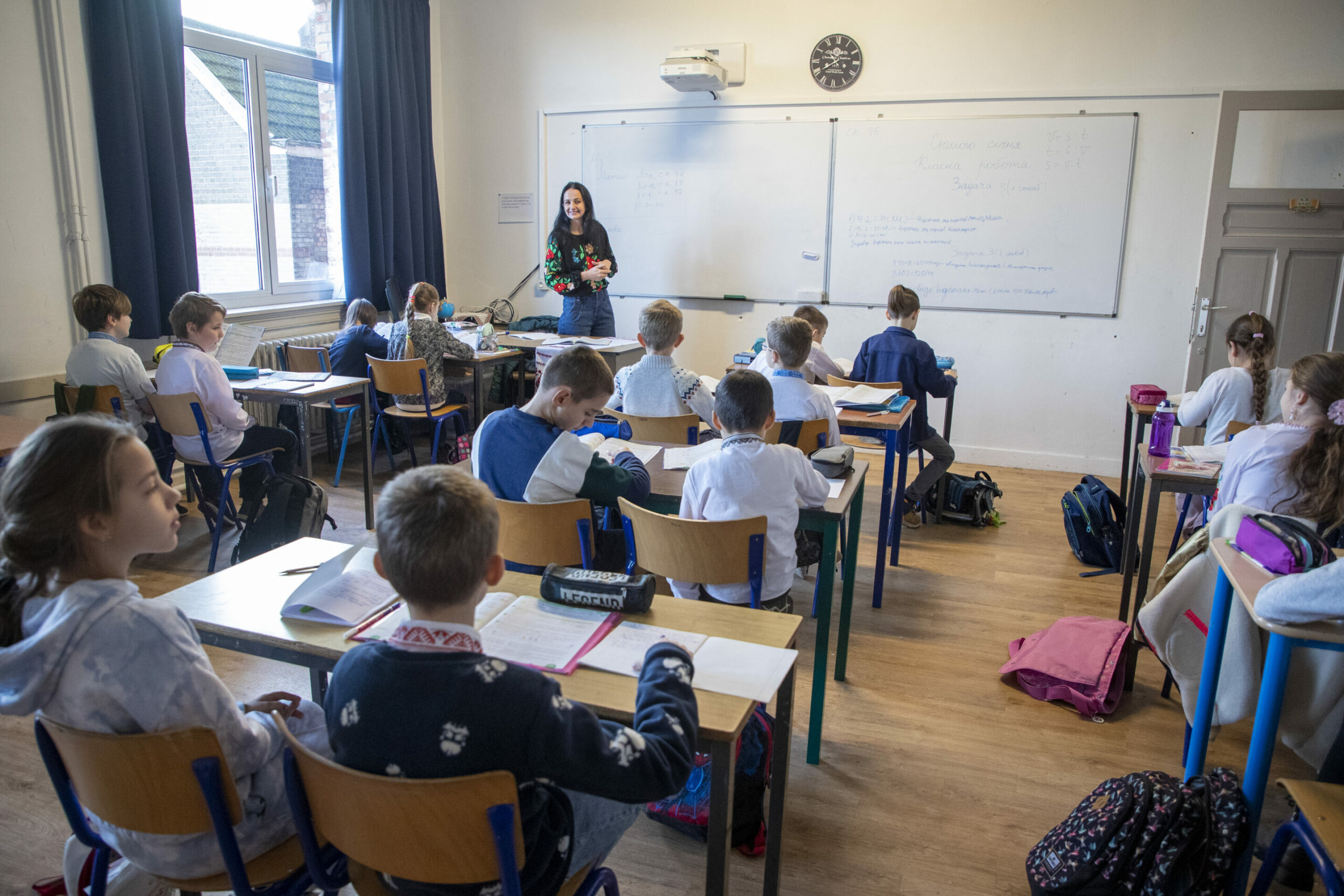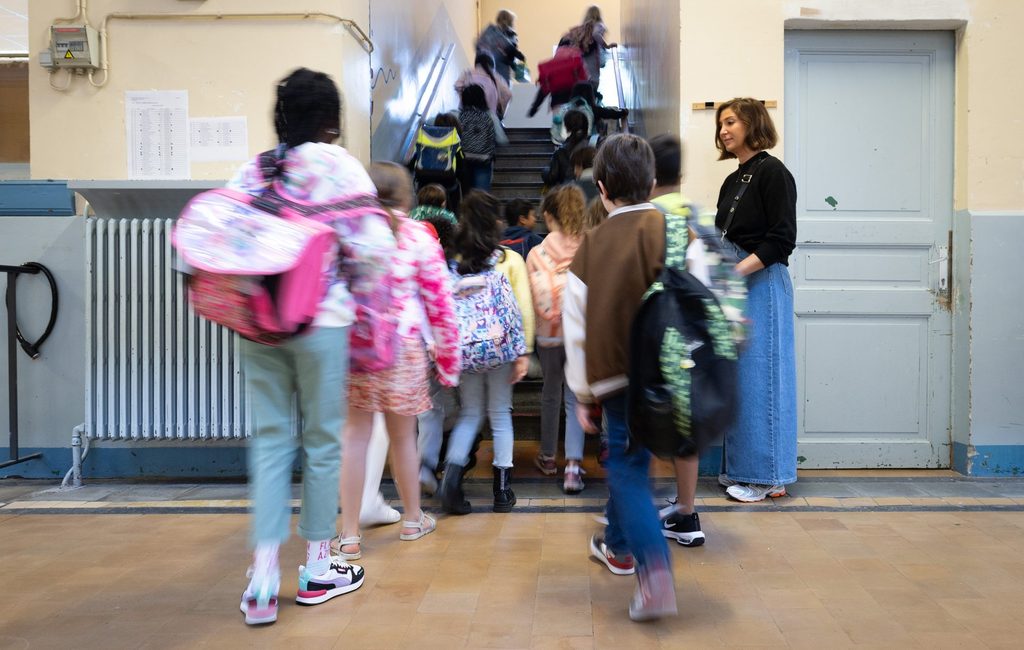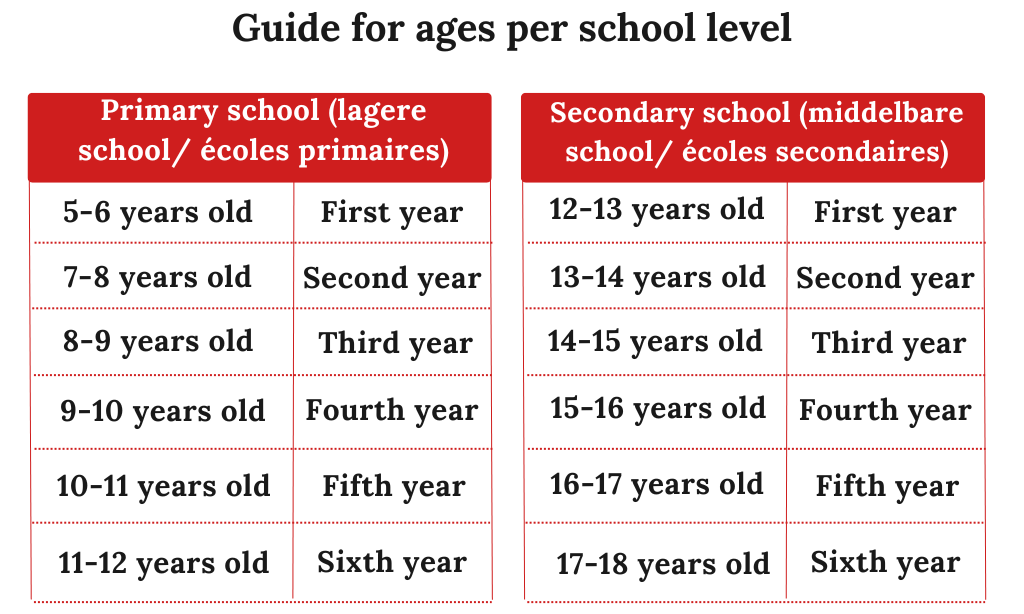Registration for the 2025-2026 school year is underway across Belgium. The Brussels Times outlines what to consider before enrolling your child in a school.
Education is compulsory between the ages of five and 18, both for Belgians and international residents. Before enrolling your child, choosing both a school system and specific school is key.
Many non-Belgians send their children to international or European schools. However, the Belgian education system is also worth considering as it offers pupils the opportunity to learn French and Dutch.
How does the Belgian system work?
Belgium's education system is fragmented, and run by different language communities: the Flemish Community (overseeing Dutch-speaking schools in Flanders and Brussels) and the French Community (for the French equivalent) comprise most of the schools. There are also some German-speaking schools.
Most Belgian schools are funded by the government, meaning there are no tuition fees. However, there are additional costs to take into account.
Pupils enter the first year of primary school between the ages of five and six. After completing the six-year primary school trajectory, they start secondary school around age 12. This period is also divided into six years. Read more here.
How to enrol
Children must enrol when entering a school for the first time, moving from primary to secondary education or moving to a new school. Newcomers must enrol within 60 days of registering at their commune.
Schools do not work based on a catchment area. Children must meet the admission criteria, but otherwise parents are free to decide on the school in which to enrol their child. Private schools set their own admissions policies: in some cases, entry procedures involve an interview and sometimes an examination.
Most schools give priority to pupils' siblings and children of school staff. They should register and enrol before others.

Pupils meet each other after the summer holidays in Sint-Pieters-Leeuw. Credit: Belga
In some schools or municipalities, parents must register their child before enrolling them. After the registration period, parents will receive a letter or an email. When enrolling, parents must show the pupil's proof of identity, vaccinations, address and academic records.
Parents interested in the Belgian education system are advised to check their commune's website. After choosing a school, contact it to find out about the practical arrangements for enrolment (whether registration is needed, when enrolments begin, etc.). The sooner this is done, the better.
A list of all the Dutch-language primary schools can be found here, and the French-speaking list can be found here. All Dutch-language secondary schools per course can be found here, and the French-language equivalent can be found here.
Dutch vs French
The practical arrangements for enrolment vary per language community, education level and even area and school of choice.
Dutch-language schools:
- Often work with online registering. If there is a chance a school will have to refuse pupils (for example, if the school is popular), then there will be a registration procedure.
- In primary schools, the application period runs from 25 February to 18 March. "Favourably ranked students" (who registered on time) can apply from 28 April to 19 May. Enrolments for all other children start on 27 May.
- In secondary schools, the enrolment period runs from 31 March to 25 April. The online tool prompts parents to enter the chosen schools in order of preference. "Favourably" ranked students can enrol from 20 May to 16 June. Free enrolments will start on the same day. In some schools, enrolment is done in-person.
- Information on Dutch-language schools in Brussels can be found here.
French-language schools:
- In Brussels, enrolments for primary schools are done via the commune's education department, while for the first year of secondary school, it is done via the region.
- Enrolment in French-speaking primary schools in Wallonia can be done up until the first school day.
- In secondary schools, parents must use the FUI single enrolment form, given by the primary school in January. Parents can then enrol their child in their first choice of school between 27 January and 14 February 2025.
Tips for newcomers
The system can be complicated, even for parents who grew up here. Annabel Declercq, co-founder and director of d-teach, a non-profit behind the first online school in Belgium, highlighted some tips to help parents from abroad.
Many consider practical elements, such as distance to the family home, accessibility by public transport and childcare facilities.
Declerq stressed that visiting the school is essential. "Ask to meet teachers of all years; ask them whether they are able to offer extra support for a non-native child. Will the child be listened to and helped?" she told The Brussels Times. Parents can attends school open days, or contact the headteacher for a tour.

Credit: Belga
Parents can also contact the local pupil guidance centre (centrum voor leerlingenbegeleiding (CLB) in Dutch-language schools and centre Psycho-Medical-Social (CPMS) in French-language schools) for advice on school choices and specialised needs. Parents can also ask to see the education inspectorate school reports, which outline strengths and weaknesses.
Talking to friends with children about their experiences can also help make a well-rounded decision. "Ask them where they sent their children, whether they were happy with the school and the class sizes," she said. "This point of view can be helpful, as schools will always sell themselves well."
Related News
- The good, the bad, and the bizarre: An expat experience with Belgian schools
- School nostalgia: Quirky customs and traditions in Belgian education
- What happens on Wednesdays? Childcare in Brussels explained
Choosing secondary schools is more complicated, Declerq noted. Parents should inform themselves about the various education streams, and where their child would best fit in based on their performance in primary school. Because not all schools offer all types of education, parents are advised to focus on the offer rather than practical elements.
"Maybe it is worth looking at a school in the neighbouring communes if they are better suited for your child. Again, it is worth contacting or visiting the schools and asking about what they offer."
Finally, pupils may not be accepted. Parents will then be informed of unfavourable ranking, and an explanation of the next steps. "In this case, add your child to the reserve list. A spot may still become available. But make sure to register at back-up schools just in case."


